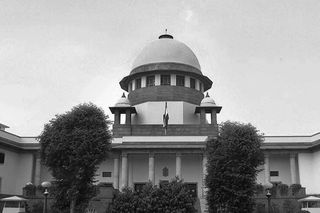
CJI Sexual Harassment Report and Response Prove Women Have No Recourse
The woman who accused Gogoi of harassment has quit the investigation after she wasn’t allowed to have her lawyer present.

On 19 April, a former junior court assistant who worked for India’s Chief Justice Ranjan Gogoi sent an affidavit to 22 judges accusing the CJI of sexual harassment. A day later, a special three-judge bench of the court held an impromptu hearing to address her statement that was bizarrely headed by the accused himself. The Supreme Court then began an internal investigation into the woman’s claims. Almost two weeks later, the woman says she’s quitting the probe because she doesn’t expect any justice from the judiciary, Reuters reported.
In a statement released Tuesday, the 35-year-old woman expressed disappointment with the evaluation process, saying she wasn’t allowed to have her lawyer with her in the proceedings, despite feeling anxiety and having difficulty hearing, and noticed there was no audio or video recording made of her statements, Reuters reported.
“I found the atmosphere of the committee very frightening and I was very nervous because of being confronted and questioned by three Supreme Court Judges and without even the presence of my lawyer/support person,” Reuters reported her saying. “I felt I was not likely to get justice from this committee and so I am no longer participating in the 3-Judge Committee proceedings.”
The woman, whose name Indian news outlets have withheld, had detailed several interactions with Gogoi in the affidavit, and claimed her refusal to acquiesce to his sexual advances resulted in her losing her job, the harassment of her family members and criminal complaints against her. Gogoi denied these allegations, and said they were part of a conspiracy to bring down the Supreme Court. The judiciary was “under threat,” and it “cannot be made a scapegoat,” he said during the initial hearing, NDTV reports.
The woman had been immediately painted by senior advocates Tushar Mehta and K.K. Venugopal as a conspirator out to take down India’s most valued institution, a sentiment echoed by Gogoi himself. This immediate disparaging of the woman is worrying — in this case particularly so, as it takes a long, historical pattern of disbelieving and punishing women who call out their harassers to a scary conclusion: something dangerously close to being perceived as legal precedent.
Scroll reported that the woman, upon rejecting Gogoi’s advances, was moved around departments for a while, and eventually terminated, as written in her affidavit — with no attempt by the Court to investigate her report. Even more notably, there appears to have been no attempt by the Supreme Court to adhere to the guidelines for responding to reports of workplace sexual harassment that it established in 1997.
But rather than be outraged, the social response, when this was made public, was to perform gold-medal-worthy feats of mental gymnastics in order to recast the woman’s report as a conspiracy to undermine the sanctity of India’s entire judicial system. Never mind that in the course of human history an older, more powerful man behaving inappropriately with a junior female colleague, and seeing her punished when she has the temerity to take exception to his actions, is far more common — banal even, at this point — than plots to take down individual judges. We have seen this cycle of reporting sexual harassment, and punishment for it, coupled with believing the accused (and/or happily forgetting they were ever called out for their misbehavior), countless times: with Bollywood’s response to Tanushree Dutta, with our unquestioning forgiveness for Aziz Ansari, with Taj Hotels’ former CEO Rakesh Sarna, who was accused of sexual misconduct by his executive assistant and who sat on the company’s committee responsible for investigating her report.
The much more likely truth here, and always, is that the woman is telling the truth and the powerful are closing ranks to protect themselves. No way is this more evident than in Gogoi’s inclusion in the special bench to consider her report. While Gogoi’s job as CJI might be to determine the truth and decide the outcome in most judicial cases, it is laughable that he would be remotely able to carry out this duty ethically in a case that could compromise him professionally. Gogoi has said he would not pass any orders on this case — how nice of him, truly — and that fellow judge Arun Mishra will decide any further recourse, but the Supreme Court’s vehement denial of the allegations and its adamant backing of Gogoi does more than hint at bias. Now, with the woman pulling out of the investigative process, it becomes apparent that the way the Supreme Court has decided to handle her case is not encouraging, and comes dangerously close to becoming a deterrent for any woman seeking justice.
Related on The Swaddle:
All The Arguments You Need: To Convince Doubters of #MeToo
In a way, this case feels like the culmination of the #MeToo movement that steamrolled through Indian media last year — the ultimate example of a man with power abusing it, and being allowed by society to feel righteous about it. It also feels like the culmination of the backlash to the movement that has been brewing for some time, which focused on protecting the accused, lest they be falsely targeted. This plays out the same way in almost all sexual harassment or assault cases: the person reporting the harassment is made to feel crazy, their motives (no matter how far fetched) are called into question; they are stripped of dignity and made vulnerable to threats. Meanwhile, the accused is allowed to participate in the determination of their guilt.
This time around, it’s happening in the highest institution in the land — a place a person who has experienced harassment should feel comfortable going to seek justice. The Supreme Court cannot be more concerned with upholding the power of those it houses than those it ostensibly protects.
With the chief justice embroiled in a scandal the court refuses to handle responsibly, people who are subjected to sexual harassment, or actual crimes, like assault, are rendered all the more powerless.
It’s time we stop putting the onus on the person reporting harassment to fight for legal recourse, and put some of that responsibility on those whose job it is to provide it. Gogoi might see the judiciary as a monolith inextricable from himself, but it’s not: It’s up to the Indian judiciary to make the distinction and set a new norm (one that is welcoming of the women it sorely needs in its ranks) by investigating a credible allegation fairly. The ball is now in their court. Looks like they have dropped it.
Related


Why You Should Include Your Preferred Pronouns in Your Social Media Bio
